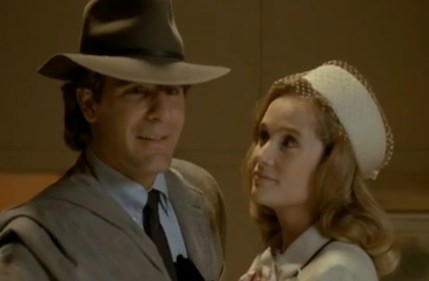“Honeymoon Express”: April 27, 1960 (with a stop in 1957)
Original airdate: September 20, 1989
Visit the Quantum Leap Rewatch index
Hey, my fellow fans, you have now officially seized control of a Quantum Leap project! For fifteen weeks, I have been moving steadily forward through the history of Quantum Leap, rewatching first “Genesis,” then making my way through to the heartbreak of “Mirror Image.” I have relived fifteen of my favorite adventures in the lives of Sam Beckett and Al Calavicci. But now it’s you leaping me hither and yon through your choices from among the ninety-five episodes of the show.
The floor is still open for a few nominations, as it happens. Your selections so far include: “The Boogeym*n,” “Last Dance Before an Execution,” “Future Boy,” “Lee Harvey Oswald,” and “Deliver Us From Evil.” But my first stop takes us all back to 1960 and to “Honeymoon Express,” where Sam finds himself on a train bound for Niagara Falls, doing his utmost not to celebrate another man’s honeymoon.
Quantum Leap’s season two opener cleverly offers returning and new viewers a quick refresher on the whole series concept, by obliging Al to justify the project’s annual 2.4 billion budget to a Congressional committee. Al’s task is made more complicated by the fact that he and Sam are both convinced, at this point, that the project has been hijacked by God. It doesn’t help that Al is the only one who can see Sam in the past. The Committee Chairman wants something more than Al’s word: if Sam’s in the past, he reasons, can’t he do something about that pesky Fidel Castro, or something that matters to national security? In a fit of desperation, Al promises him that they’ll change the outcome of the 1960 U-2 Incident.
Sam doesn’t know that his funding is on the line. He has leaped into Tom McBride of the NYPD, lucky new groom of the feisty Diane. Tom, strangely enough, has brought his gun, badge and cuffs along for the trip to Niagara Falls… but otherwise he seems like a normal enough newlywed. The crew of the train sure thinks so: their porter is all ready to leave the two lovebirds alone together, and even to ply them with champagne.
In “Honeymoon Express,” Sam’s natural bashfulness combines beautifully with heroic self-restraint. He’s sincerely tempted: Diane is adorable and passionate and ready to get her honeymoon on, and she’s got the lingerie to prove it. Al, of course, suggests that he make mad passionate love to the willing new bride (and then have her get her well-connected dad to interfere with the U-2 launch!) but there’s no question of Sam actually actually doing it. “I’m not in love with her,” he objects at first. He could also add, though he doesn’t: that would be icky!
Sam’s efforts to keep Diane focused on her upcoming bar exam do help cool things off a little. Then he catches a real break, sort of, because Diane’s insane ex-husband turns up, and he’s keen to murder them both. Homicidal stalkers can be so distracting.
Government interference with Project QL is a story element that surfaced a few times in the show’s early seasons and then, essentially, vanished. I always rather liked it. It injects a rare and pleasing hint of realism into this universe that Sam’s time traveling comes with a taxpayer pricetag in the billions. And it’s witty that an effect of his being diverted by God, Fate, or Time (as they sometimes put it on the show, though in “Honeymoon Express” they stick with blaming the deity) is that ordinary American citizens reap the benefit of all that spending. Putting right what once went wrong, if we really could do it, would be an amazingly good use of public funds. And the moral of the story is as pertinent today as it was in 1989: it’s a quiet reminder that even very powerful governments can’t always spend their way to what they want.
Al shines as he appeals to the nobler instincts of the Congressional committee. He argues that Quantum Leap’s survival shouldn’t be based on the bottom line. He speaks about the intrinsic value of questing after knowledge, of fulfilling humanity’s collective destiny. It is the same dream that drives NASA. Even as he tries to nudge Sam onto a pragmatic, government-friendly path, he urges Congress to strive for idealism.
Finally, the threat to the project gives us one of the greatest Sam-Al scenes of the show’s run, when Al owns up to the problems he’s having in the future and the two of them face the prospect of separation. The goodbye they don’t get in “Mirror Image” very nearly happens in “Honeymoon Express.” (The story of Sam’s leap parallels nicely with these events, of course: Diane and Tom are newly married and now a hostile outsider is looking to drive them apart).
This season two opener may, in fact, be one of the most packed and significant leaps of the whole show. In “Honeymoon Express,” Sam faces the threat of being abandoned, he falls, a little, for Diane, he rescues a kitty, affects the outcome of Diane’s entire career and the Project, and discovers that he is capable of killing, at least when someone else’s life is on the line.
Okay, maybe he doesn’t change the outcome of the Cold War, but one can only expect so much.
A.M. Dellamonica writes novels and short fiction and teaches writing online. She is passionate about environmentalism, food and drink, and art in every form, and dabbles in several: photography, choral music, theater, dance, cooking and crafts. Catch up with her on her blog here.











Oooh, oooh, if it’s not on the list yet, please review “Jimmy”. Al’s speech in that episode is one of the very few moments in television that’s actually made me cry.
OK! Jimmy is on the list. Thank you, Hatgirl!